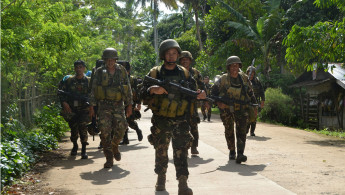Duterte: Filipino rebels fighting to establish an 'Islamic caliphate'
The Philippines' new controversial "crime fighting" president has claimed that Muslim separatists in the south of the country are working to establish an "Islamic caliphate" in Asia, similar to the Islamic State group.
Rodrigo Duterte said in a speech on Saturday that his government would maintain efforts to fight the Abu Sayyaf extremist group, based primarily in the country's autonomous Muslim region.
It comes just days after the Duterte came under fire for a row with the US over Washington's claims that Filipino police have carried out the extrajudicial killings of hundreds of alleged drug dealers.
Dutere appears keen to mend ties with the US after personally insulting President Barack Obama.
"They are hungry for a fight to establish a caliphate in Southeast Asia," said Duterte. "It's either the caliphate or nothing."
The Abu Sayyaf Islamic group have been fighting in a conflict that has killed more than 120,000 people since the 1970s in a country with a Catholic majority population.
Experts have confirmed that Abu Sayyaf are not linked to the Islamic State group in Syria and Iraq and are not fighting to extend Abubakr al-Baghdadi's self-proclaimed "caliphate".
In a speech in Laos earlier this month, Duterte said that he would "eat" Abu Sayyaf militants after an attack which killed 15 people.
"If I have to face them, you know I can eat humans," he said.
"I will really open up your body. Just give me vinegar and salt, and I will eat you."
Duterte won elections to becoming president earlier this year, promising to fight rampant crime and a growing drug problem.
But claims of alleged drug dealers being shot by police and not arrested have sparked anger from human rights group and the US, a close ally of the South Asian archipelago.





![Netanyahu furiously denounced the ICC [Getty]](/sites/default/files/styles/image_330x185/public/2024-11/GettyImages-2169352575.jpg?h=199d8c1f&itok=-vRiruf5)
![Both Hamas and the Palestinian Authority welcomed the ICC arrest warrants [Getty]](/sites/default/files/styles/image_330x185/public/2024-11/GettyImages-2178351173.jpg?h=199d8c1f&itok=TV858iVg)
